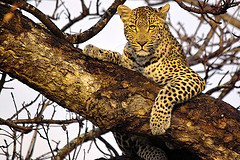6. Solved exercises
Paco has been reading about wild animals all morning. He is really excited about finding so many species in their natural habitat and he knows he won't be disappointed with the experience. He has paid special attention to some information about the leopard. This animal belongs to the group of the four 'big cats', also including the lion, the tiger and the jaguar.
As many other animals, its number has decreased dramatically due to an excess of hunting and loss of habitat, what makes it a possible endangered species if limits are not imposed. Despite this fact, Africa is the place where most leopards are found nowadays.
The leopard is similar to the jaguar in appearance although the leopard is smaller. It is a very aggressive and dangerous predator. It's good at hunting other animals because it is very agile and stealthy, and it has very powerful jaw muscles. Paco also thought it was similar to the cheetah but it is very different from it: the spots are different and the leopard is bigger than the cheetah.
Studies have shown that it is a very solitary animal which is not used to interacting with other leopards. However, it is very aggressive and research shows there have been violent encounters between them, especially when fighting for a female leopard.
The leopard likes climbing trees and spends great part of the day resting on tree branches. It is used to hunting at night, being antelopes their favourite prey in Africa. Leopards must compete for food with other predators. They have managed to live with these other animals by hunting at different times or in different places. Sometimes leopards have to leave their dead prey high up in a tree. Paco has read that their prey doesn't have to be smaller than them; quite the contrary, they can carry animals which are much heavier. 'They must be really strong animals then', Paco thought. Our friend knows this animal is difficult to find but he hopes to see it in his next adventure.
Let's find it out!
 |
| By Arno & Louise, C. Commons |
Answer the following questions:
1. According to the text, why are there less leopards nowadays?
2. According to the text, what are the main characteristics of a leopard?
| VERB TENSE |
EXAMPLES |
| Present Perfect Simple |
|
| Present Perfect Continuous |
1. You look tired. all morning? (work)
2. What a nightmare! She two hours talking about her holiday. (spend)
3. Paco in Maasai Mara Park yet. (arrive)
4. You on the phone for over an hour! Put the phone down! (talk)
5. already in New York? (your friends, arrive)
Do they express...?
a) Obligation.
b) Lack of obligation.
c) Deduction.
What preposition must follow these adjectives? Find them in the text:
| TO BE + ADJECTIVE + PREPOSITION |
- excited
- disappointed
- similar
- good
- different
2. It at night, being antelopes their favourite prey in Africa. (hunt)
3. Paco couldn't speak much English at first but he soon all the time. (talk)